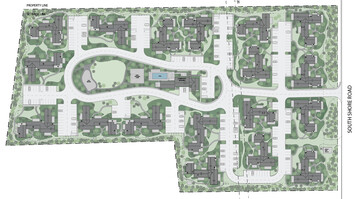Town Drops Lawsuit Against Surfside Crossing, Announces Agreement With Developers
Jason Graziadei •

After nearly five years of acrimony over the proposed Surfside Crossing 40B development off South Shore Road, the town on Tuesday announced that it was dropping its lawsuit against Surfside Crossing after reaching a “collaborative agreement” with the developers.
The agreement outlines a commitment by the Select Board and the Surfside Crossing developers to earmark 75 percent of the 156 condominiums in the development to “directly serve year-round housing needs.” That goal would be accomplished through long-term deed restrictions at a variety of income levels.
“While there are details to work out and, importantly, other potential collaborators to involve, the Select Board on behalf of the Town has, at the request of the developers, elected at its April 13th, 2023, Executive Session to drop the appeal of the HAC’s issuance of the comprehensive permit as part of beginning this collaborative process,” the Select Board and Surfside Crossing developers Jamie Feeley and Josh Posner announced in a joint statement.
The town was one of three entities that filed lawsuits last October to challenge the state Housing Appeals Committee's approval of the Surfside Crossing development.
While there were no specific commitments of funding by the town to achieve the restrictions or other affordability provisions within the project, the joint statement indicated the Select Board and the Surfside Crossing developers had reached agreement on a “set of principles” to achieve that goal “and move forward in good faith collaboratively.”

Those principles include:
- The Select Board and the developers agree that the best version of the project allows for 75% of the project to directly serve year-round housing needs.
- To that end, all parties are committed to working together to achieve the 75% year-round objective through, wherever viable, long-term deed restrictions at a variety of income levels (e.g., AMI’s from 100-240% -- above and beyond the 40B requirement that 25% of the project be restricted at 80% AMI or less) up to and including simply a “year-round” restriction without any income element.
- In all cases, if law or practicality does not permit a permanent restriction, the minimum restriction length would be 30 years — potentially with an option to renew. Permanent restrictions are desirable.
- For the units that are to be year-round (e.g., the 75%), there would be a requirement that they are owned either by year-rounders, or by local businesses or local not-for-profits for the exclusive use of their local employees.
Read the full joint statement from the Select Board and Surfside Crossing
“We can either work together or continue to fight and hold up this project further and make it more expensive,” said Select Board member Dawn Hill Holdgate. “We realized the approach was probably wrong from the beginning. Realistically, this project could have been built already in a more thoughtful and less expensive way where people would already be living there.”
The news of the accord comes as the Surfside Crossing developers recently announced that they are targeting July for the groundbreaking on the project.
“This day represents turning a corner into the world of working collaboratively together,” said Surfside Crossing co-developer Josh Posner. “There are a bunch of details to work out but the principles are there. It makes all the difference to be on the same side working together to accomplish something.”

While Surfside Crossing has been hotly debated on the island since it was first proposed in 2018, the state Housing Appeals Committee approved the developers’ 156 condominium unit proposal in September over the objections of the Nantucket Land Council, along with a group of neighbors and community members known as Nantucket Tipping Point, and at the time, the town’s Zoning Board of Appeals (ZBA). The HAC's ruling vacated the ZBA’s decision to permit a scaled-down development of 60 units, and requires it to issue an amended comprehensive permit allowing for the 156 condominium units of the development to move ahead.
As it stands today, Surfside Crossing’s 156 condominium homes would be contained within 18-three story buildings (two stories above grade) on 13 acres of undeveloped pine forest off South Shore Road. As a Chapter 40B development, 25 percent of those units are required by the state to be deed restricted for affordable housing, or a total of 39 units within the development, to residents earning at or below 80% of the area median income.
Feeley had said in a recent statement that he hoped potential partnerships and collaborations with the town, as well as with island businesses and organizations, would result in up to 75 percent - or 117 units - ending up in local ownership. They will be priced between $500,000 to $1.5 million.
Although Surfside Crossing has received approval from the state Housing Appeals Committee, it is still facing two lawsuits filed by the Nantucket Land Council, the non-profit group Nantucket Tipping Point.
“The Select Board does not support these other appeals,” today’s joint statement reads.
In January, the developers started the clear cutting of the 13-acre property with the removal of largest trees on the site, even as neighbors and others gathered to protest. In the aftermath, the Nantucket Tipping Point group assailed the town administration for failing to disclose that Surfside Crossing had obtained a state permit that allowed them to move forward with the tree removal.
The plans for Surfside Crossing were filed under a state statute known as Chapter 40B, which allows developers to bypass local zoning regulations and increase density if at least 20 to 25 percent of the new units have long-term affordability restrictions.